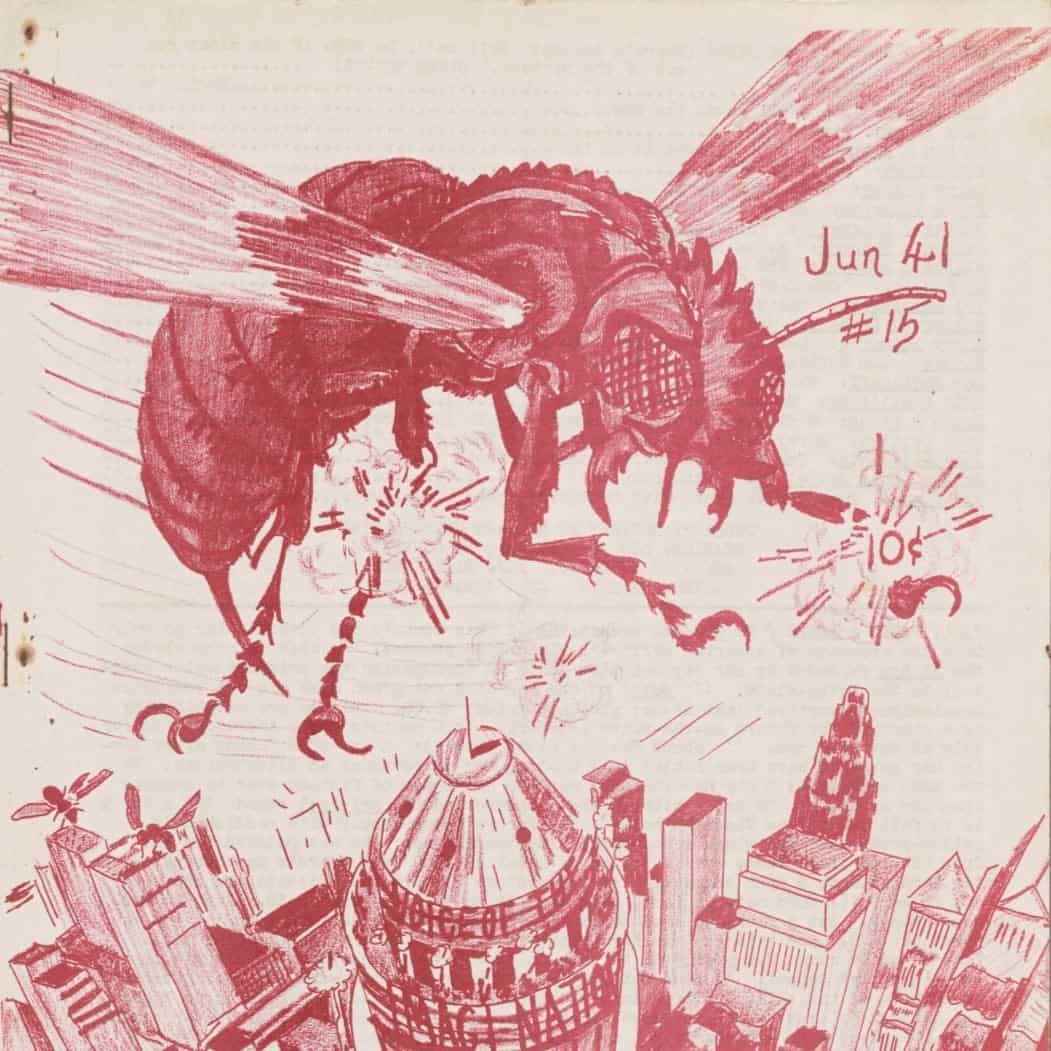The Digital Scholarship & Publishing Studio proudly shares this guest blog post from Russell Aaronson of Coral Springs High School, Coral Springs, Florida, detailing his and his students use of the Hevelin Fanzine Collection in DIY History.
* * *
Clicking through The University of Iowa’s DIY History Hevelin Fanzines archive sent me back to everything that drew me to SF in the first place. Alternately measured and freewheeling, scientific and psychotronic, the Hevelin zines reminded me of what Science Fiction was like before Lucas and Spielberg legitimized the genre with blockbuster summer films and action figures hiding under the Christmas tree.
Or, perhaps more accurately, the Hevelin Archives reminded me of the books I read in between the blockbusters. After Vader froze Han and blew Luke’s mind at the end of Empire, I had to do something during the three-year wait for closure. I started with dusty, library-sale collections of Wells and Verne. For Halloween I wanted to be Dune’s Duncan Idaho, but settled for a more recognizable Captain America. My friends and I passed around Douglas Adams books until they disintegrated, and I spent far too much time trying to get the Babel Fish in the Hitchhikers’ text-adventure video game (or, more aptly, failing to get the Babel Fish, just to read the precious, extra lines of text written by the author himself).
Too many years later, in graduate school, I bumbled into a Speculative Fiction course delivered by Dr. Bob Collins. His course was great – but the impromptu discussions over heaping plates of curry and biryani (which he’d never let us grad students pay for – he was equally generous with his time and his money) got me past my “serious” literature phase. Bob told me to read PKD’s Ubik and I was as stunned as I had been in the theater watching Empire years before.
Recently, the good folks at Coral Springs High School and Broward College offered me the chance to teach a Dual Enrollment elective, and I dove headlong into building a Speculative Fiction course for kids who needed a break from AP exams without losing the challenge of university-grade content. For this course, the Hevelin Fanzines seemed like a perfect fit – taking part in the University of Iowa’s DIY History project would give students a taste of scholarly research while also rounding out their knowledge of the history of Speculative Fiction.
But there was one particularly challenging issue – the nature of the Hevelin content itself. How do you set the table for teens to meaningfully respond to the wonderfully thoughtful and utterly bizarre content found in the zines? Fortunately, IDEAL (Iowa Digital Learning and Engagement) had an excellent “Archives Alive!” lesson as part of their DIY History project, and after a few nips and tucks to accommodate the nature of the Hevelin Fanzines, I unleashed the project on an unsuspecting class.
The response was beyond my highest expectations. As a foundation, the students learned the importance of doing careful, thoughtful transcriptions with an end-product that would be part of a larger body of real-world research, and not just another disposable assignment to be completed tonight and forgotten tomorrow.
But when students moved beyond transcriptions and constructed their textual/historical analyses, they quickly found ways to connect the Hevelin zines to ideas learned in many of their favorite courses. Students who love history were compelled by the appeals for Technocracy and the rejections of consumerism in an issue of Mikros. While reading Paradox, another group saw the links between fears of time travel and the perils of unchecked technological innovation, deftly connecting the zine’s discussion to the horrors of V1/V2 rocket attacks in Europe. Skilled debate students considered the pacifist arguments against organized religion in Voices of the Imagination, and the He-Man-Woman-Haters’-Club tone of Diablerie was a difficult issue for a mixed-gender transcription team.
When wrestling with the more unusual content in the zines, students didn’t disappoint. A discussion of the newsletters from The Colorado Fantasy Society found relatable humor in the rivalries between SF conventioneers; and discussions about portions of The Futurian War Digest and The Reader and Collector were marked by the creators’ fierce, ideological obsessions over presentation in the form of typefaces, formatting and illustrations. Some students delved into the history of SF itself, noting reviews of Heinlein (observed as a writer “fast on his way to the top” in 1940) and Van Vogt (identified as a writer who had taken a turn for the worst, even before having published his first hit novel).
Of course, students also latched on to some of the more esoteric content in the zines as well. From rating rum collections to planning garden designs, the unpredictable Hevelin collection rarely disappoints.
After teaching LIT 2310 with the help of IDEAL, Archives Alive! and the DIY History Hevelin Fanzines as a cornerstone project, it’s difficult to imagine the course without it. I only wish I could go back to grad school, split some Naan with Dr. Bob, and tell him all about it.
We at Coral Springs High School continue to mourn the loss of our fellow students and teachers at Marjory Stoneman Douglas High School. If you are interested in providing support for victims and families of the shooting, please visit the official Stoneman Douglas Victims fund page at: www.gofundme.com/stonemandouglasfund
Russell Aaronson teaches Dual Enrollment Literature and Film and AP Research at Coral Springs High School, Coral Springs, Florida in the Broward County Public Schools.
